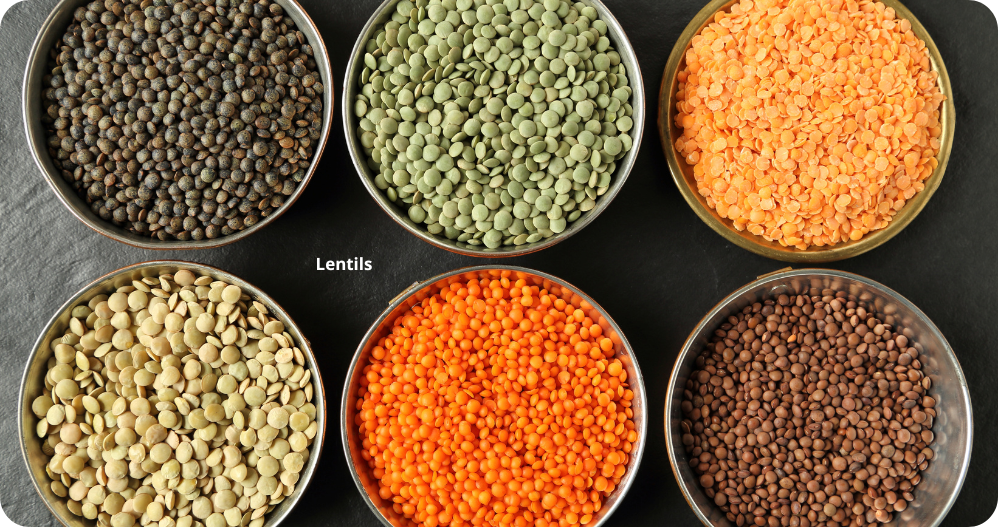Having just finished a bowl of lentils…I thought looking into the health value of lentils might be something worth looking into!
Lentils are a small but mighty legume that has been a staple in diets around the world for thousands of years. Revered for their nutritional benefits, lentils are more than just a versatile ingredient in your kitchen; they offer a myriad of health benefits that make them a worthy addition to any diet. But what makes lentils so healthy? Let’s delve into the reasons behind their nutritional powerhouse status.
1. Rich in Essential Nutrients
Lentils are a nutritional treasure trove. They are packed with essential nutrients that support overall health. One cup of cooked lentils provides significant amounts of protein, fiber, vitamins, and minerals. They are particularly rich in:
Protein: Lentils are an excellent plant-based source of protein. With about 18 grams of protein per cup, they make a valuable alternative to animal-based proteins, especially for vegetarians and vegans.
- Fiber: They contain an impressive amount of dietary fiber, with approximately 16 grams per cup. Fiber is crucial for maintaining digestive health, preventing constipation, and promoting a feeling of fullness, which can aid in weight management.
- Iron: Lentils are a good source of iron, providing around 37% of the daily recommended intake in a single serving. Iron is essential for forming red blood cells and transporting oxygen throughout the body.
- Folate: With about 90% of the daily recommended value in one cup, lentils are an excellent source of folate. Folate is vital for DNA synthesis and repair and is particularly important for pregnant women to support fetal development.
- Potassium: They are also high in potassium, a mineral that helps regulate blood pressure, balance fluids, and support proper muscle and nerve function.
2. Heart Health
Lentils contribute to heart health in several ways. Their high fiber content helps reduce cholesterol levels by binding to bile acids in the digestive system and removing them from the body. This process helps lower low-density lipoprotein (LDL) cholesterol, commonly known as “bad” cholesterol.
Additionally, lentils are low in saturated fat and contain no cholesterol, making them a heart-friendly food choice. The potassium and magnesium in lentils also support cardiovascular health by helping to regulate blood pressure and maintain proper heart function.
3. Blood Sugar Regulation
Lentils have a low glycemic index, which means they have a minimal impact on blood sugar levels compared to high-glycemic foods. The combination of high fiber and protein content helps to stabilize blood sugar levels by slowing down the digestion and absorption of carbohydrates. This makes lentils an excellent choice for people with diabetes or those looking to manage their blood sugar levels.
4. Weight Management
Due to their high fiber and protein content, lentils are particularly filling. This satiating effect can help control appetite and reduce overall calorie intake, which is beneficial for weight management. Studies have shown that including lentils in the diet can help reduce hunger and promote feelings of fullness, making them a great addition to a weight loss or weight management plan.
5. Digestive Health
The dietary fiber in lentils plays a crucial role in maintaining a healthy digestive system. Fiber adds bulk to the stool, which aids in regular bowel movements and prevents constipation. Additionally, fiber acts as a prebiotic, feeding the beneficial bacteria in the gut and promoting a healthy microbiome.
6. Antioxidant Properties
Lentils are rich in antioxidants, which help combat oxidative stress and reduce inflammation in the body. These antioxidants include polyphenols, which have been shown to have protective effects against various chronic diseases, including heart disease and certain types of cancer.
7. Versatility and Accessibility
Aside from their health benefits, lentils are incredibly versatile and easy to incorporate into a wide range of dishes. They come in various colors and types, including green, brown, red, and black, each with its unique flavor and texture. Lentils can be used in soups, stews, salads, and even as a meat substitute in burgers and meatballs. Their long shelf life and affordability make them an accessible option for many people, making it easier to enjoy their health benefits.
8. Environmental Benefits
In addition to their personal health benefits, lentils also contribute to environmental sustainability. They have a relatively low carbon footprint compared to animal-based protein sources. Lentil cultivation is less resource-intensive, requiring fewer fertilizers and pesticides, and they even improve soil health by fixing nitrogen in the soil, which reduces the need for synthetic fertilizers. Incorporating lentils into your diet can be a small but impactful step toward more sustainable eating practices.
9. Potential for Disease Prevention
Research suggests that a diet rich in legumes, including lentils, may help reduce the risk of chronic diseases. Regular consumption of lentils has been associated with a lower risk of heart disease, hypertension, type 2 diabetes, and even certain types of cancer. Their combination of fiber, antioxidants, and essential nutrients contributes to their disease-preventive properties.
Conclusion
Lentils are a remarkable food that offers an array of health benefits. Their rich nutrient profile, heart-healthy properties, blood sugar regulation, and digestive support make them a valuable addition to any diet. Beyond their individual benefits, lentils also offer environmental advantages, making them a sustainable choice for both personal health and the planet. Whether you’re looking to improve your overall health, manage your weight, or simply enjoy a versatile and delicious food, lentils are a great option that delivers on all fronts. Embracing lentils as part of your regular diet can lead to improved well-being and a healthier lifestyle.
If you have any questions or comments about this article, please feel free to share in the comments section below.

